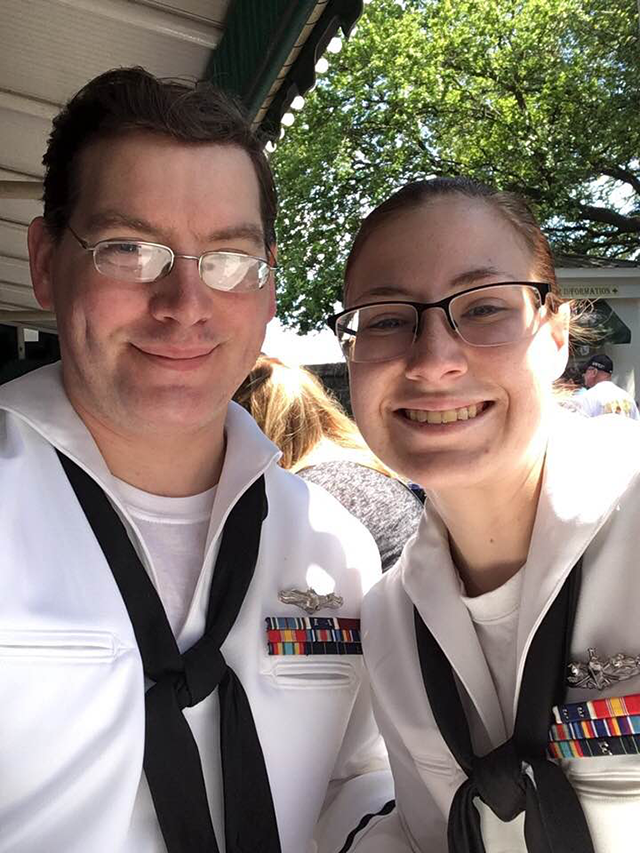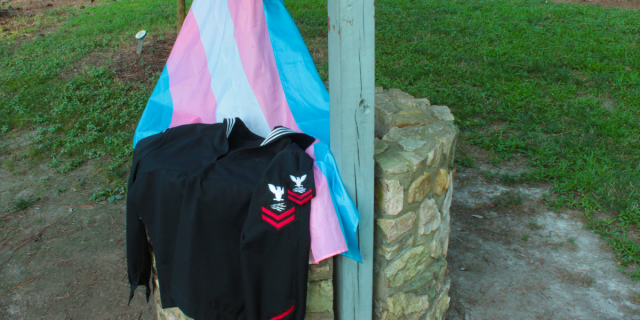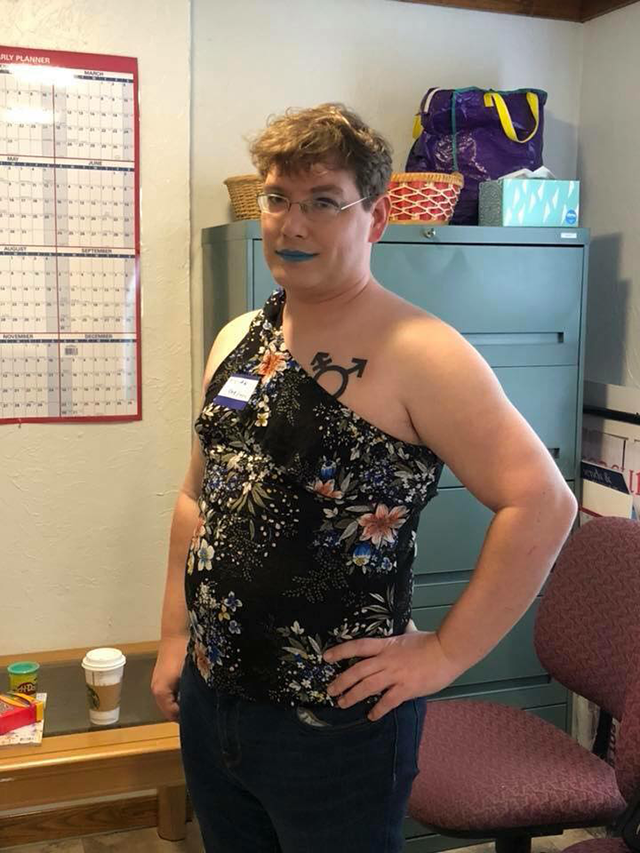It’s July of 2016, and I’m sitting in my senior chief’s office and trying not to panic. The Department of Defense has finally announced that it has lifted the ban on transgender service members. I’ve been waiting for over a year now for this to happen. Now I can be myself, which means I have to come out to the senior enlisted member of my division. There’s no way to do this from the closet. That doesn’t make it any less nerve-wracking. I barely slept the night before. I have no idea how this man — who has served 18 years in the Navy and who up until hours ago had insisted people like me were unfit for duty — will react.
I tell Senior that the ban on trans folks has been lifted and that I am one of them, or at least as best as I can. The whole thing I’d prepared goes entirely out of my head. I improvise. I explain that while the DoD has not said exactly how it’s going to work yet, I intend to begin transitioning as soon as possible. I say that while I know it’s new and unexpected, this is something I have to do. And this man, who typically displays all the warmth and empathy of a thrown brick, kindly tells me that I will have the division’s full support.
As relief washes over me, I tell him that I want to come out to the division after quarters that morning, and he says that will be fine.
I’ve been out as a trans woman in the US Navy for almost exactly two years now – the same amount of time that we’ve been allowed to serve openly in the military, in fact. Those two years have been full of ups and downs. I’d like to think there have been more ups. I’ve made a lot of friends since coming out, and I’ve strengthened the friendships I already had. I’ve also lost a few people. Everyone on my ship knows; my parents and sisters don’t. I don’t know how to tell them, and right now I don’t think I want to.
One person I haven’t lost is my lovely wife, for which I am deeply grateful. She was the first person I told, three years ago when all we knew was that the DoD was considering possibly lifting the ban. I don’t think I could have made it through this without her standing beside me, loving me and supporting me.
In a flashback in Sense8, Nomi tells Neeta, “No one’s ever stood up for me before.” That’s me and my Frankie.
This comes as a surprise to a lot of people, as the third most common question I’m asked is when she’s leaving me.
“As soon as possible” isn’t as soon as I would have liked. After lifting the ban, the DoD doesn’t issue actual guidance for transitioning in the military for another two months. In mid-October, I finally get a copy of the implementation handbook for the new transgender policy. It’s at once hopeful and frustrating. I learn that I will need a formal diagnosis of gender dysphoria; to formulate a treatment plan with doctors at the regional Naval Medical Center; to have my commanding officer approve the plan before I can begin; to have a doctor determine that I am “stable” in my transition, whatever that means; and to obtain legal documentation that my gender has been changed. Once I complete all of these steps, I can update my gender marker in DEERS, the military’s personnel records system (again, with my CO’s permission).
Until I have completed all of these steps, I will be required to present as male while on duty.

Honestly, the medical part of things has been the easiest, and that surprised me. I don’t like everything about the way the military has implemented its policy on transitioning while serving, but I don’t have any complaints about the way medical professionals, both on and off the ship, have treated me. My doctors and corpsmen have been kind, forthcoming, and most importantly, entirely willing to assist with my transition.
A lot of it boils down to attitude. My senior medical officer and the members of the transition team at NMC Portsmouth have approached my treatment with a simple set of assumptions – that I am a woman, that I am transgender, and that my treatment is medically necessary. They believe that I am trans because I told them I was; they believe my treatment is necessary thanks to the work of my trans siblings who came before me, who made the medical establishment accept that we are real.
That’s something I try to remember on the rough days – how fortunate I am. I have the privilege of access to care when many trans folks do not. From a formal diagnosis to my first endo appointment was two months; from that first appointment to my prescription was three months more, and much of that delay was just due to demand for appointments. This shouldn’t be a privilege – we should all have access to speedy, respectful medical care.
After that first “official” coming out in July, my leading petty officer (or, my immediate supervisor) tells the division not to spread it around; it’s my business, he says. I start telling people immediately, of course; I’ve had to hide who I was for too long. I want to be known as me, not this male persona that was forced on me. My friends are supportive, mostly.
Word spreads slowly in that first year; as far as I know, the only people who know are those I’ve personally told. At least until I’m finally convinced to make a new Facebook profile. Then friends of friends of friends suddenly know, as I get requests from people I’ve definitely seen in the passageway once or twice… it’s a big ship, after all. Some people want to talk about it; others shrug and go on about their business.

It’s actually liberating; I decide that “everyone” knows and stop worrying about having to hide. It actually becomes a bit of a funny surprise whenever it turns out someone hasn’t heard yet. Not everyone approves, for how little it matters, but my reputation is good enough that they hold their tongues. Mostly.
I find out well after the fact that one male sailor has ventured the opinion that trans folks don’t belong because we’re “mentally diseased.” A friend overhears and proceeds to jump down his throat and make herself a nest in his torso.
After that first year, I notice a general pattern. My female coworkers tend to accept me as one of the girls; the men still see me as one of the guys. Within days of my coming out, Vanessa invites me to join a new dance class she’s been taking. Crystal refuses to use male pronouns for me regardless of what the policy says. Jasmin wants to give me a makeover.
The guys eventually stop making the sort of low-grade sexist comments that guys make when they think there are no women around, but only after I make several pointed remarks. Mostly they avoid the subject of my gender, if they don’t forget about it entirely. The few men who want to talk about it seem weirdly obsessed with “the surgery.”
There are exceptions, of course, and at this point my online profile is low enough that I haven’t had my first encounter with TERFs. I start developing my first female friendships, which helps a great deal considering I’m still being called “he” and “him” twenty times a day. These relationships feel deeper than the friendships I had before. Maybe it’s a sense of sisterhood, maybe it’s that I’m feeling more in touch with my emotions. Soon, the other gals are asking when I’m moving into female berthing already.
Not soon enough for me. Presenting as male every day hurts. When the ship is in port, it’s not as bad; I grow to hate coming in to work, but once the day ends I can go home and be myself. When we’re underway, it’s worse. I’m stuck being “him” all day, every day. Sometimes for days, sometimes for weeks… once, for months. My shipmates and my chain of command are supportive, but I can tell they don’t really understand how much it hurts.
“Be patient,” I’m told.
“I’ve been patient,” I say.
The biggest hurdle has been on the legal side of things. Per instruction, only three forms of documentation are acceptable to support a gender marker change – a birth certificate showing the correct gender; a court order for a change of gender; or a passport showing the correct gender. The first two proved to be unfeasible. I was born in Texas, and while there’s kinda sorta a way to change the sex on your birth certificate there, there was no way for me to get that done without a court order. I had first pinned my hopes on that – in Virginia, there’s a statute governing change of sex. You just have to have your doctor provide a letter stating that your sex has been “changed by medical procedure”. The statute (and, so far as a lawyer could tell, the relevant case law) doesn’t state what that entails, but the local law clerk decided that HRT wasn’t it.
So, a passport was my only option. When I turned in my application at the post office, the man told me it would be three to four weeks. It turned out to be closer to three months later. Three months and three letters from my doctor… or more accurately, the same letter three times, each one very slightly different to meet some nit picky bureaucrat’s demands. It hurt, facing rejection after rejection, first from the local circuit court and then from the passport center. My doctor had signed off on my transition back in December of last year.
I need a doctor’s letter for everything. I think I need a doctor’s letter for a library card. It’s a different doctor’s letter every time.
A few days ago I learned that my passport has finally been issued. I have finally submitted the request to change my gender marker. Soon, I’ll be able to be me, all the time.

I’d lulled myself into a false sense of security. I’d been expecting something since November, but after months and months of no change to the policy, I thought that maybe they’d just forgotten about us. Maybe everything was going to be okay.
“Don’t look at Twitter!” my wife says, horrified.
I mean, of course you’re going to look.
I found tweet after tweet describing the news — that the current administration had announced a reinstated ban on trans folks in the military.
I cried for an hour.
Is that selfish? I wasn’t crying just for me. I have a wife. We have two children. I know military service is controversial within the queer community, but my job pays for our housing, puts food on our table, provides my family with medical care. We need it for now.
I spent the next three and a half months trying to do my job while trying to search for another one, just in case. No one knew what was going to happen. No one knew when we’d be discharged, what kind of discharge it would be, whether we’d get severance, nothing.
No one knew if my family was going to be left homeless and starving.
Yeah, I’m still angry. I don’t talk about it much, but I’m angry. The first preliminary injunction came down within a few days of my birthday. Isn’t that funny?
It’s been two years. I’m still only almost done with my “official” transition… and with my time on this ship. I only need my captain’s signature on my request and an administrative review at the service-wide personnel command, and then in the Navy’s eyes I’ll be a woman. Two more steps. I don’t know how long the last one will take.
I’ve been on my ship for almost three years now. By the time my transition is “complete,” I’ll probably know what command I’m going to next. I’ve gone from being the new gal to running a watch team, from hardly knowing anything to being considered a subject matter expert.
Around the time the current administration made its second attempt at a renewed ban, my LPO called me the cornerstone of the division’s future.
I hope that doesn’t sound arrogant. Goddess knows I’ve been accused of it before. It’s just a reflex. To “prove” we don’t belong, they say we’re a burden; I try to prove I’m one of the best. I don’t even believe that myself. I’m good at my job, but I know people who are better; I know a lot, but I know how much more I have to learn.
I shouldn’t have to prove that I belong here.
We shouldn’t have to prove that we belong anywhere.
We’re outside on the gallery deck, watching the sun set over the Atlantic, when a friend notices the nametag on my coveralls says “Vivian.”
“Hey, I didn’t know that you’d changed your name already.”
“Back in November,” I say. “It went into the Navy’s system three months ago.”
“Huh,” she says. “I can’t remember your old name anymore.”
I just smile.








Comments
This is a beautiful piece of writing, thank you for sharing your story with us Vivian. I hope you write more for Autostraddle.
Thanks for sharing this story, Vivian, and thank you for your service.
This was gorgeous and sad and hopeful; thank you for writing it and I wish you the absolute best as you continue to face all this infuriating bureaucratic uncertainty and hoop-jumping.
This is a beautiful piece! Love seeing more trans voices on AS!
This was interesting to read. I’m glad your female coworkers have been so accepting. I hope things are going well for you.
Thanks for sharing!
Thank you for posting this it was beautifully written and it’s so important that stories like yours get out there more. I really hope that things work out well for you and your family, and thank you again for sharing I’m sure it wasn’t easy to make yourself vulnerable like this.
The bravery that shines through every line of this piece and the courage that it must have taken to share your story give me a tiny sliver of hope for America. Thank you.
Vivian, that was incredible. Thank you so much! I hope you’ll keep writing for Autostraddle.
Thank you so much for sharing with us, Vivian – it was beautifully written
Thank you for sharing your experience and your wonderful writing.
Thank you so much for all of your kind comments! I’m glad you all enjoyed this essay; it was a little scary writing it, but I’m happy it was able to be seen.
Thanks for writing, Vivian! It makes me angry that so much of your life is at the whims of terrible people, from the law clerk to that sorry excuse for a president. I hope you find bureaucratic and employment stability soon. <3
Thank you for sharing! <3
Vivian,
This is beautifully written and you are a beautiful human. Keep crushing it!